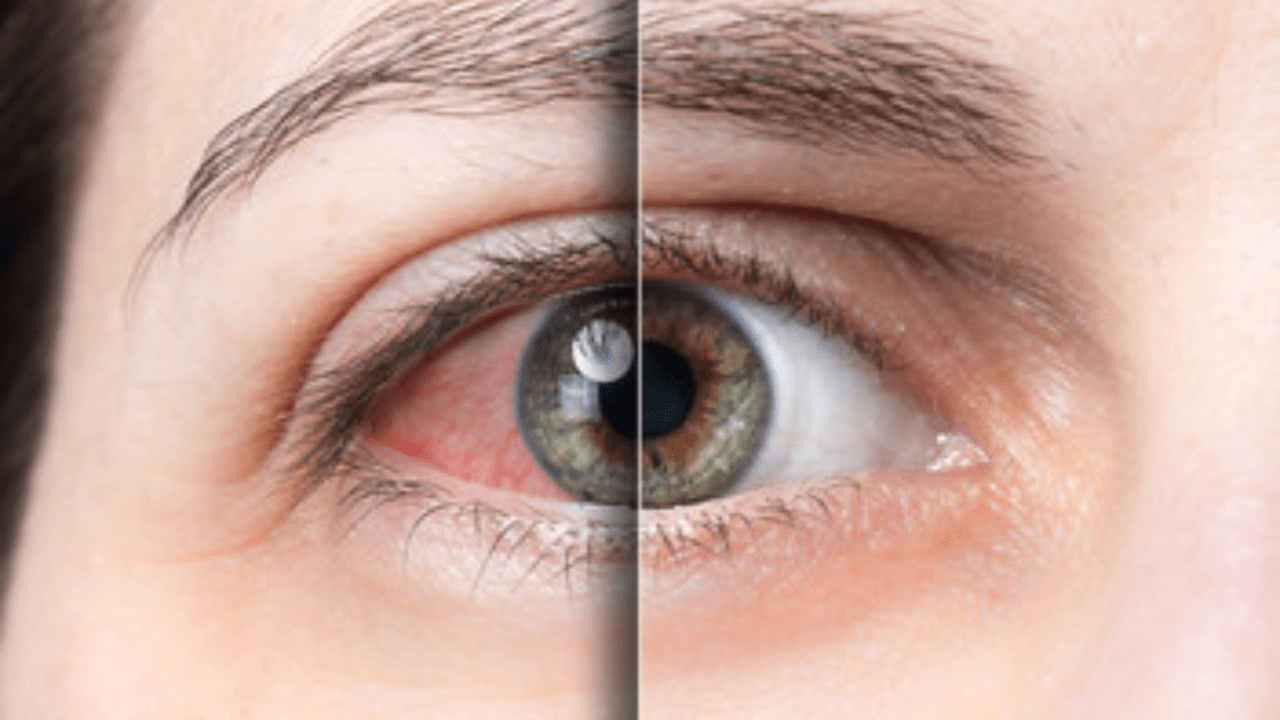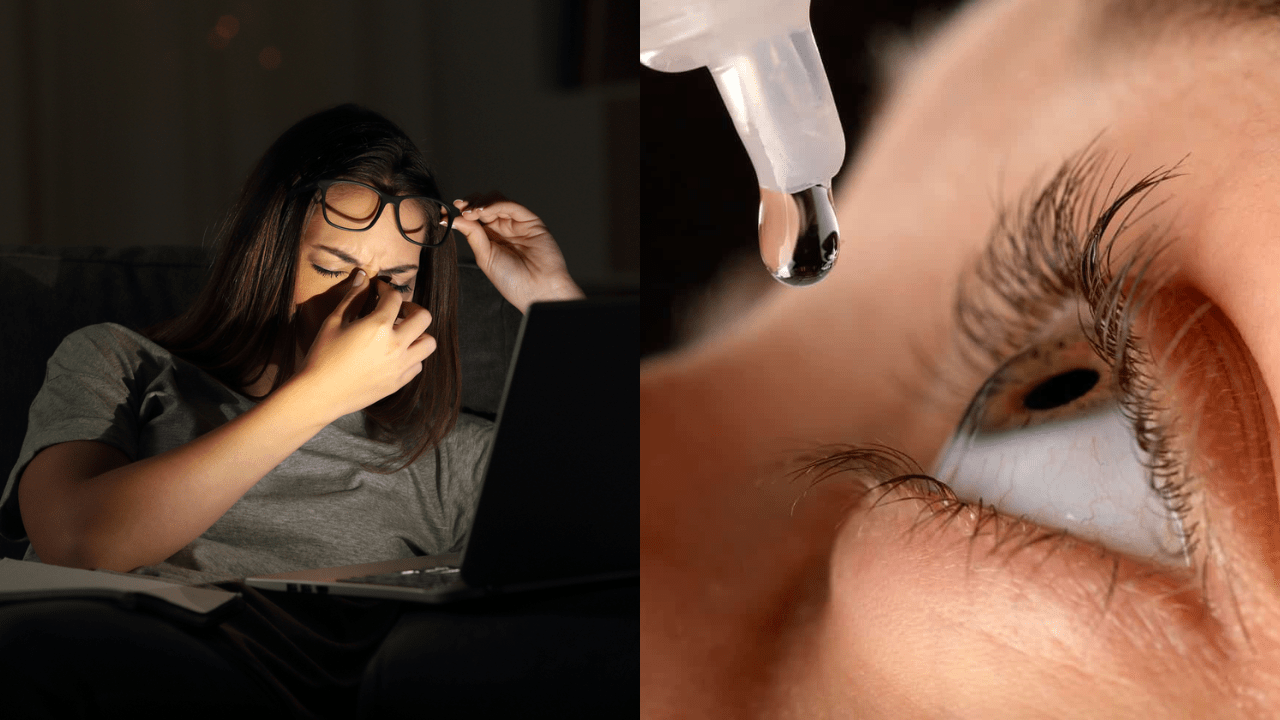Do your eyes feel itchy while watching your phone or laptop? It might be because of Dry eyes. Dry eye syndrome, though common, can significantly affect your quality of life if left untreated!

Dry eyes, a common condition affecting millions globally, can significantly impact one’s quality of life. This blog explores the causes, significance, home remedies, and medical treatments for dry eye syndrome, providing a comprehensive guide to managing this condition effectively.
What is Dry Eye Syndrome?
When tears leave your eyes too soon or insufficiently, it can lead to dry eye syndrome. Tears are necessary for both clear eyesight and preserving the condition of the cornea. Dry eyes can lead to discomfort, visual disturbances, and even damage to the eye’s surface.
Significance of Dry Eyes
Understanding and addressing dry eyes is crucial for several reasons:
- Comfort: Persistent dryness can cause discomfort and irritation.
- Vision: Dry eyes can lead to blurry vision and difficulty performing tasks like reading or using digital devices.
- Eye Health: Untreated dry eyes can result in inflammation, abrasion of the corneal surface, and even ulcers or vision loss in severe cases.
- Quality of Life: The discomfort and vision problems associated with dry eyes can affect daily activities and overall well-being.
Causes of Dry Eyes
Dry eyes can result from various factors, including:
- Aging: Tear production tends to decrease with age, particularly in postmenopausal women.
- Medications: Certain medications, such as antihistamines, decongestants, antidepressants, and blood pressure medications, can reduce tear production.
- Medical Situations: Diabetes, thyroid issues, and rheumatoid arthritis can all be factors in dry eyes.
- Environmental Factors: Exposure to smoke, wind, dry climates, and prolonged screen time can exacerbate dry eyes.
- Hormonal Changes: Hormonal changes during pregnancy, menopause, or use of contraceptives can affect tear production.
- Eyelid Problems: Conditions that prevent the eyelids from closing properly can cause the tears to evaporate too quickly.
- Laser Eye Surgery: Procedures like LASIK can temporarily disrupt tear production.
Symptoms of Dry Eyes
Common symptoms include:
- Stinging or burning sensation.
- Sensitivity to light.
- Redness of the eyes.
- Feeling of having something in the eyes.
- Difficulty wearing contact lenses.
- Difficulty with nighttime driving.
- Watery eyes (the body’s response to irritation).
- Blurred vision or eye fatigue.

Medical Treatments for Dry Eyes
When home remedies are not sufficient, medical treatments can provide relief:
- Artificial Tears: Over-the-counter lubricating eye drops can help keep the eyes moist.
- Prescription Eye Drops: Medications like cyclosporine (Restasis) and lifitegrast (Xiidra) help increase tear production and reduce inflammation.
- Punctal Plugs: Small plugs inserted into the tear ducts help retain tears on the surface of the eye.
- Lipid-Based Eye Drops: These drops help replenish the oily layer of the tear film, reducing evaporation.
- Autologous Serum Drops: Made from the patient’s blood, these drops contain growth factors that promote healing.
- Eyelid Surgery: In cases where eyelid problems contribute to dry eyes, surgical intervention may be necessary.
- Intense Pulsed Light (IPL) Therapy: This treatment can help improve the function of the meibomian glands, which secrete oils into the tear film.
Preventive Measures for Dry Eyes
Adjust Your Environment: Avoid direct exposure to air conditioning, fans, and heaters.
Use Protective Eyewear: Wear sunglasses or goggles to protect your eyes from wind and dry air.
Take Breaks: Follow the 20-20-20 rule (every 20 minutes, look at something 20 feet away for 20 seconds) to reduce eye strain.
Maintain Good Eye Hygiene: Clean your eyelids regularly to prevent inflammation and blockages.
Manage Underlying Health Conditions: Proper management of conditions like diabetes and thyroid disorders can help reduce the risk of dry eyes.
When to See a Doctor
If you experience persistent dry eyes or if over-the-counter treatments do not provide relief, it is important to see an eye care professional. They are able to identify the fundamental cause of your problems and suggest the best course of action.
In Short
Dry eye syndrome, though common, can significantly affect your quality of life if left untreated. By understanding the causes, symptoms, and available treatments, you can take proactive steps to manage and alleviate the discomfort associated with dry eyes. From simple home remedies to advanced medical treatments, there are numerous ways to keep your eyes healthy and comfortable.
Taking good care of your eyes is essential to your general health. If you suspect you have dry eyes, consult with an eye care professional to determine the best course of action for your specific needs. By staying informed and proactive, you can maintain optimal eye health and enjoy a better quality of life.
Read Next:

The Psychology of Love: Why Valentines Day Matters More Epic Than You Think
Discover the psychology of love and why Valentines Day is more important than you think. Learn how love impacts the brain, strengthens relationships, and boosts

Premier League Highlights: Arsenal Humiliate Man City 5-1, Spurs and Palace Secure Crucial Wins
Arsenal demolished Manchester City 5-1 in a statement premier league highlights win, reigniting their title hopes. Meanwhile, Crystal Palace stunned Man United 2-0, and Tottenham

How Budget 2025 Impacts the Indian Middle-Class: Major Tax Benefits and Glaring Omissions
Budget 2025 offers major tax relief to the middle class, including zero tax on incomes up to ₹12 lakh. However, it misses out on incentives

Degrees vs Employability: Why “Highly Qualified Degree Holders” Struggle to Find Jobs While “Less Qualified Individuals” Get Hired Faster!
Many highly qualified individuals struggle to secure jobs, while less qualified candidates get hired quickly. This Degrees vs Employability paradox is caused by employer preferences,

The Power of Mindset: Why Looking Poor Doesn’t Make You Poor, but Thinking Poor Does!
Discover why looking poor doesn’t define your wealth but thinking poor does. Learn the power of mindset and how a growth-oriented mindset can lead to

Overthinking: How It’s Damaging Today’s Youth – Causes and Cure in 2025
Understanding how overthinking is silently damaging today’s youth, from its causes rooted in societal pressure and social media to its long-term effects on mental health.
